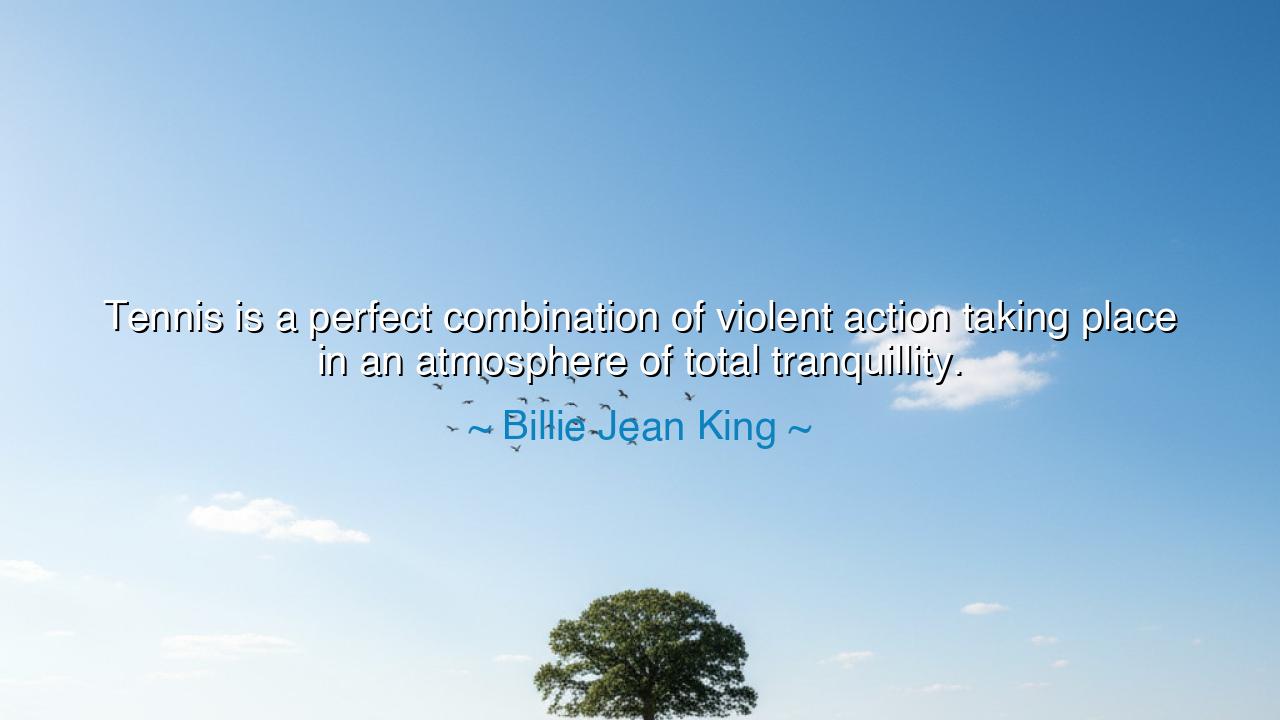
Tennis is a perfect combination of violent action taking place in
Tennis is a perfect combination of violent action taking place in an atmosphere of total tranquillity.






When Billie Jean King, warrior of the courts and voice of equality, declared, “Tennis is a perfect combination of violent action taking place in an atmosphere of total tranquillity,” she spoke with the insight of one who lived the paradox of the game. In those words, she captured the dual nature of tennis: at once graceful and brutal, serene and explosive, silent and thunderous. To the untrained eye, it appears as a gentleman’s contest upon quiet lawns; but to those who step inside its lines, it is a battlefield of will, speed, and fury, fought in near silence, without the clash of armor or the roar of drums.
The origin of this wisdom lies in King’s own career, where she fought not only her opponents across the net, but also society itself, demanding equal rights for women in sport. She knew that tennis is unlike other games—there are no colliding bodies as in football, no blaring horns as in basketball arenas. Instead, there is a hush, a reverent quiet, in which every thundering serve, every lunging volley, carries the violence of war wrapped in the tranquillity of ritual. King, with the soul of both fighter and philosopher, revealed the essence of tennis: the harmony of extremes.
The ancients would have understood this paradox well. For in the stillness of the battlefield before the clash, the air trembled with unspoken violence. In the silence of the temple, rituals carried the power of storms. Tennis is such a rite: the hushed crowd mirrors the sacred silence of a sanctuary, while within the lines, athletes unleash their strength in strokes that crack like thunder. It is a perfect union of tranquillity and action, of serenity and strife, teaching us that true beauty often lies in the balance of opposites.
Consider the story of the 1973 Battle of the Sexes, when King faced Bobby Riggs in one of the most watched tennis matches in history. The Houston Astrodome was filled with spectacle, yet when play began, it became what it always is: a game of silence punctuated by violence. Each serve, each rally was an explosion of effort and intensity, but the atmosphere remained one of almost reverent calm. King, embodying both composure and ferocity, triumphed, not only defeating Riggs but also striking a blow for women everywhere. Her words echo that very night: fierce action performed in a temple of stillness.
The lesson is profound: life itself is a balance between violence and peace, action and stillness. Our struggles—whether in work, in relationships, or in causes greater than ourselves—demand fierce energy, yet must be carried out with composure, dignity, and clarity of mind. If we let chaos overrun us, we lose direction; if we cling only to tranquillity, we never strike. To live well is to master both: the storm and the silence, the blow and the breath.
What then must we do? First, cultivate tranquillity within ourselves, a calm heart and mind that can withstand pressure. Second, when the moment comes, unleash the full measure of your strength, with no hesitation, like the violent swing of a racquet at full force. Third, learn to honor both sides of the paradox: the serenity that sustains you and the action that defines you. For this is the secret not only of tennis, but of all true mastery.
Thus, Billie Jean King’s words endure: “Tennis is a perfect combination of violent action taking place in an atmosphere of total tranquillity.” They remind us that beauty is not the absence of struggle, but the harmony of struggle within peace. Let us then step onto the courts of our lives as King once did—calm in spirit, fierce in action, uniting storm and silence into a life of both tranquillity and triumph.






AAdministratorAdministrator
Welcome, honored guests. Please leave a comment, we will respond soon